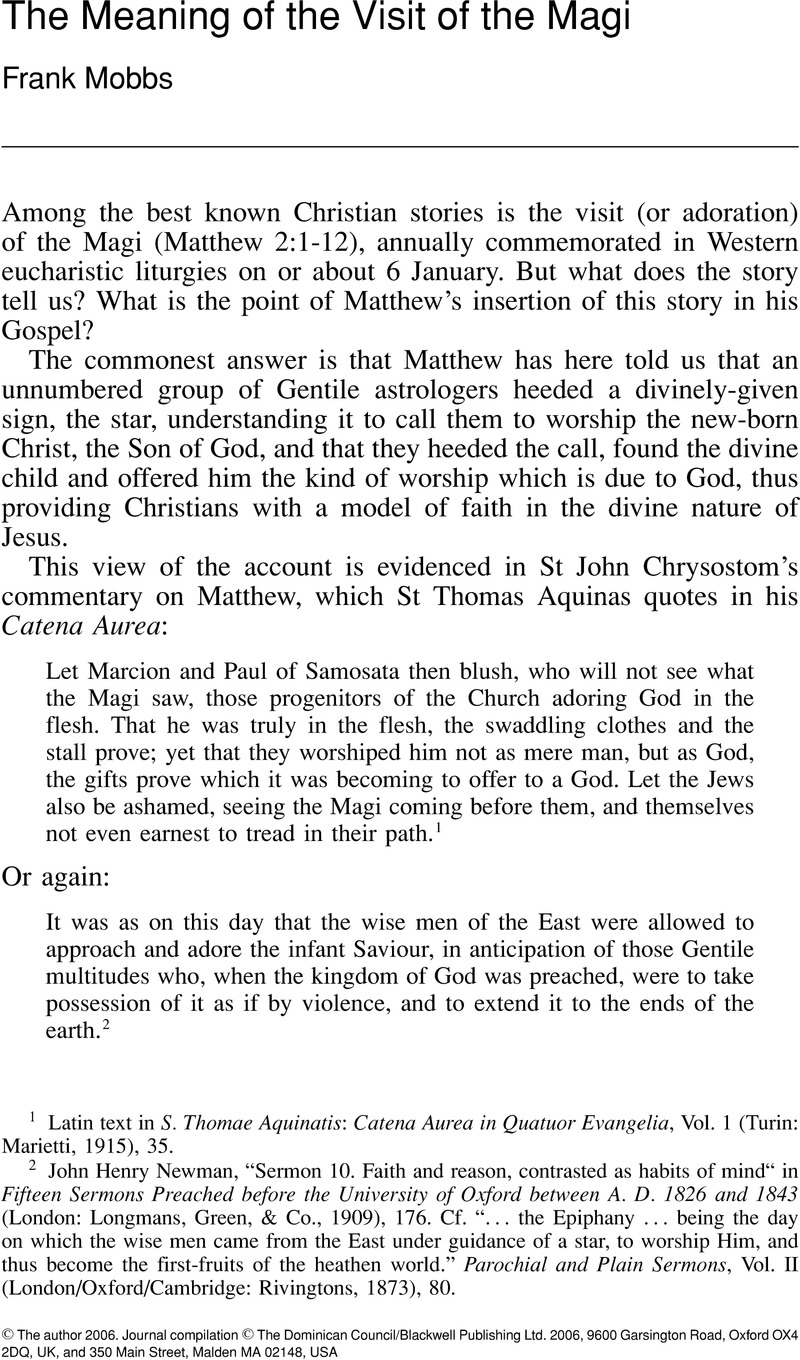Article contents
The Meaning of the Visit of the Magi
Published online by Cambridge University Press: 01 January 2024
Abstract

- Type
- Original Articles
- Information
- Copyright
- © The Author 2006. Journal compilation © The Dominican Council/Blackwell Publishing Ltd 2006, 9600 Garsington Road, Oxford OX4 2DQ, UK and 350 Main Street, Malden, MA 02148, USA
References
1 Latin text in S. Thomae Aquinatis: Catena Aurea in Quatuor Evangelia, Vol. 1 (Turin: Marietti, 1915), 35Google Scholar.
2 John Henry Newman, “Sermon 10. Faith and reason, contrasted as habits of mind“ in Fifteen Sermons Preached before the University of Oxford between A. D. 1826 and 1843 (London: Longmans, Green, & Co., 1909), 176Google Scholar. Cf. “… the Epiphany … being the day on which the wise men came from the East under guidance of a star, to worship Him, and thus become the first-fruits of the heathen world.”Parochial and Plain Sermons, Vol. II (London/Oxford/Cambridge: Rivingtons, 1873), 80Google Scholar.
3 Here I am reliant on the economical analysis of intentionality of Moore, Gareth, A Question of Truth: Christianity and Homosexuality (Continuum: New York/ London, 2003), 49-55Google Scholar. Moore uses the spelling “intensionality”.
4 This point is succinctly expressed by the Council of Trent: …Christum adoremus, et Sanctos, quorum illae similitudinem gerunt, veneremur (… we are adoring Christ and venerating the Saints whose likeness these images bear) (DS 1823). The distinction is between adoring and venerating, a distinction marked by different beliefs about Christ (God), on the one hand, and the saints, on the other.
5 Lack of textual evidence has not prevented invention of explanation: “But there must have been some special Divine revelation whereby they knew that ‘his star’ meant the birth of a king, that this new-born king was very God, and that they should be led by ‘his star’ to the place of the God-King's birth (St. Leo, Serm. xxxiv, ‘In Epiphan.’ IV, 3).”The Catholic Encyclopedia, Vol. IX (Appleton: 1910), 530Google Scholar.
6 Brown, Raymond E., The Birth of the Messiah (London: Geoffrey Chapman, 1977), 175Google Scholar.
7 Second Samuel 5:1-3 is an account of the selection and anointing of David as king of Israel - a political ruler.
8 Harrington, Daniel J., The Gospel of Matthew (Collegeville, MN: Liturgical Press, 1991), 42Google Scholar.
9 Brown, The Birth of the Messiah, 174.
10 Greeven, Heinrich, “proskyneô” In Theological Dictionary of the New Testament (Grand Rapids, MI: Eerdmans, 1988)Google Scholar edited by Gerhard Friedrich and translated by Geoffrey W. Bromiley, Vol. VI, 763.
11 Vaux, Roland de, Ancient Israel: Its Life and Institutions (London: Darton, Longman & Todd, 1974), 113Google Scholar.
12 “Ils avaient identifié le Roi par signe de ciel. Leur programme était de l'adorer (2, 3). Ce programme est maintenant rempli.” Laurentin, René, Les Évangiles de l'Enfance du Christ: Vérité de Noel au-dela des Mythes (Paris: Desclée & Desclée de Brouwer, 1982), 327Google Scholar.
13 “But as they are convinced that He is the divinely ordained King, this idea firmly set in their minds is enough to win their reverence for Christ.”Calvin, John, A Harmony of the Gospels Matthew Mark and Luke, Vol. 1 (Grand Rapids, MI: Eerdmans, 1972), 88Google Scholar, edited by David W. Torrance and Thomas F. Torrance, and translated by A. W. Morrison.
14 Byrne, Brendan, “The Messiah in whose name ‘the Gentiles will hope’ (Matt:13-21): Gentile inclusion as an essential element in Matthew's Christology”, Australian Biblical Review 50 (2002), 60Google Scholar.
15 Powell, Mark Allan, “The magi as wise men: re-examining a basic supposition”, New Testament Studies 46, 6Google Scholar.
16 Powell, “The magi as wise men”, 11.
17 de Vaux, 105. In “L'onction du Christ”Nouvelle Revue Théologique 3, 1958, 251Google Scholar, I. de la Potterie writes, “Mais dans le Nouveau Testament, l'onction est liée à l'oeuvre du salut dans son développement historique, elle indique l'inauguration d'un ministère, d'une fonction du Christ.“
18 In another Gospel, that of Luke, Jesus claims to have been anointed for announcing good news, etc. (4:16-21).
19 Pope Pius XII's encyclical, Quas Primas (1925), proclaiming the Feast of Christ the King, witnesses to the same tendency as is to be found in the Gospels, namely, that of trying to make Jesus a king when their fragmentary accounts of the life of Jesus show he rejected claims to be king.
20 “This indeed we know to be taking place ever since the three Magi were called from their far-off land and were led by the star to recognise and worship the king of heaven and earth.” Saint Leo the Great, Sermon 3, Epiphany, as quoted in the Office of Readings for the Feast of Epiphany in the current Liturgy of the Hours of the Latin Rite.
21 “Matthieu présente l'enfance dans la perspective de toute la suite, Passion comprise.” Laurentin, René, Les Évangiles de l'Enfance du Christ: Vérité de Noel au-delà des Mythes (Paris: Desclée & Desclée de Brouwer, 1982), 327Google Scholar.
22 Dodd, C. H., The Founder of Christianity (London: Collins, 1971), 103Google Scholar.
23 An Introduction to New Testament Christology (Paulist Press: New York/Mahwah, NJ, 1994), 160 (footnote omitted). Cf. John L. McKenzie, The Jerome Biblical Commentary (London/Dublin/Melbourne: Geoffrey Chapman, 1970), Vol. 2, 67: “Without denying the unity of history and of themes, we maintain that the concrete historical reality of Jesus Christ is predicted nowhere in the OT. Jesus exceeds the limits of the OT knowledge of God; for, in his own words, one cannot put new wine into old wineskins. The radical novelty of his person and of his mission can be seen in the very designation Messiah/Christ … The early Church proclaimed Jesus as the Messiah, well aware that no figure like him can be found in the OT.
- 1
- Cited by


